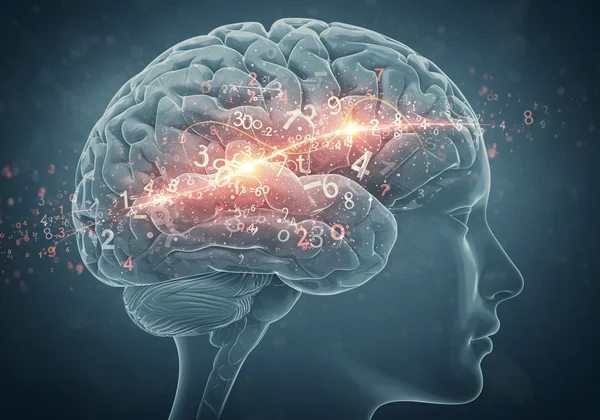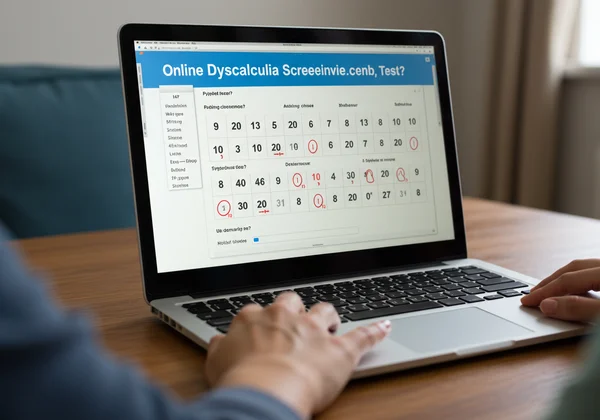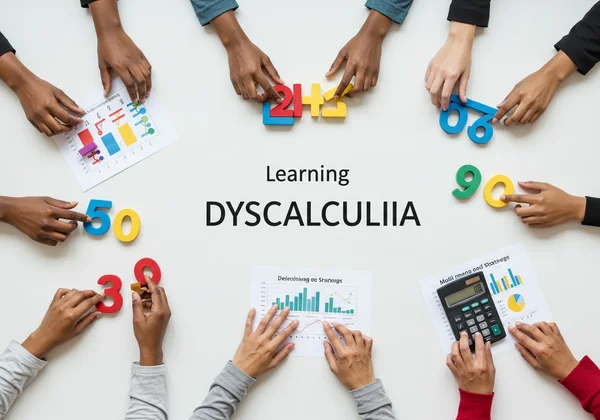คู่มือภาวะบกพร่องทางการเรียนรู้คณิตศาสตร์ (Dyscalculia): อาการ, การทดสอบ & กลยุทธ์สนับสนุน
October 30, 2025 | By Aisha Bennett
บทนำ: ปลดล็อกความมั่นใจทางคณิตศาสตร์: คู่มือฉบับสมบูรณ์เพื่อทำความเข้าใจภาวะบกพร่องทางการเรียนรู้คณิตศาสตร์
คุณเคยสงสัยไหมว่า 'ฉันเป็นดิสแคลคูเลีย หรือแค่ไม่เก่งคณิตศาสตร์กันแน่?' หากตัวเลขรู้สึกเหมือนเป็นภาษาต่างดาวและงานคณิตศาสตร์ทำให้คุณรู้สึกหวาดกลัว คุณไม่ได้อยู่คนเดียว คู่มือภาวะ dyscalculia ฉบับสมบูรณ์นี้ออกแบบมาเพื่อช่วยให้เข้าใจความแตกต่างในการเรียนรู้ที่พบบ่อยนี้ได้ง่ายขึ้น โดยนำเสนอความชัดเจน การยืนยัน และเส้นทางที่ชัดเจนไปข้างหน้า เราเชื่อว่าการเข้าใจ "สาเหตุ" เบื้องหลังความท้าทายของคุณคือขั้นตอนแรกในการสร้างความมั่นใจและปลดล็อกศักยภาพที่แท้จริงของคุณ
สิ่งที่คุณจะค้นพบในคู่มือนี้
ในบทความนี้ เราจะสำรวจแง่มุมหลักของภาวะ dyscalculia ตั้งแต่คำจำกัดความและสัญญาณที่พบได้ในแต่ละช่วงวัย ไปจนถึงกระบวนการทดสอบ ที่สำคัญกว่านั้น เราจะแบ่งปันกลยุทธ์และทรัพยากรที่ช่วยเสริมศักยภาพเพื่อช่วยในการใช้ชีวิตในโลกที่สร้างขึ้นด้วยตัวเลข เรามุ่งมั่นที่จะเปลี่ยนความสับสนให้เป็นความเข้าใจ และความวิตกกังวลให้เป็นการลงมือทำ
หมายเหตุเกี่ยวกับเครื่องมือคัดกรองฟรีของเรา
ขณะที่คุณอ่าน โปรดจำไว้ว่าความรู้คือพลัง เพื่อช่วยคุณในการเดินทางครั้งนี้ เราได้พัฒนาเครื่องมือคัดกรองฟรีที่ออกแบบโดยนักจิตวิทยาการศึกษาและผู้เชี่ยวชาญด้านคณิตศาสตร์ นี่คือขั้นตอนแรกที่เป็นความลับ เข้าถึงได้ง่าย เพื่อทำความเข้าใจลักษณะการเรียนรู้เฉพาะตัวของคุณให้ดียิ่งขึ้น คุณสามารถ ทำแบบทดสอบฟรี ได้ตลอดเวลา
ภาวะ Dyscalculia คืออะไร? นิยามความท้าทายในการเรียนรู้คณิตศาสตร์
ภาวะ Dyscalculia คือความบกพร่องทางการเรียนรู้ที่เฉพาะเจาะจงและต่อเนื่อง ซึ่งส่งผลกระทบต่อความสามารถของบุคคลในการเรียนรู้ทักษะทางคณิตศาสตร์ ไม่ใช่เรื่องของการขาดสติปัญญาหรือความพยายาม แต่เป็นความแตกต่างทางระบบประสาทในการประมวลผลข้อมูลตัวเลขของสมอง บุคคลที่มีภาวะ dyscalculia อาจมีปัญหาเกี่ยวกับการรับรู้เชิงปริมาณเบื้องต้น มีความยากลำบากในการจดจำข้อเท็จจริงทางคณิตศาสตร์ และพบว่าการใช้เหตุผลทางคณิตศาสตร์เป็นเรื่องที่ท้าทาย

ภาวะ Dyscalculia กับ ความวิตกกังวลทางคณิตศาสตร์: ความแตกต่างที่สำคัญ
สิ่งสำคัญคือต้องแยกแยะภาวะ dyscalculia ออกจากความวิตกกังวลทางคณิตศาสตร์ แม้ว่าทั้งสองมักเกิดขึ้นพร้อมกัน ความวิตกกังวลทางคณิตศาสตร์คือการตอบสนองทางอารมณ์ของความกลัวหรือความตึงเครียดเมื่อเผชิญหน้ากับคณิตศาสตร์ ในทางกลับกัน ภาวะ dyscalculia คือความแตกต่างทางปัญญาที่ทำให้การประมวลผลตัวเลขเป็นเรื่องยากโดยธรรมชาติ ในขณะที่บางคนที่มีความวิตกกังวลทางคณิตศาสตร์อาจเข้าใจแนวคิดแต่กลับทำอะไรไม่ถูกภายใต้ความกดดัน บุคคลที่มีภาวะ dyscalculia จะมีปัญหากับแนวคิดพื้นฐานด้วยตัวมันเอง ซึ่งอาจ ก่อให้เกิด ความวิตกกังวลทางคณิตศาสตร์ตามมา
ความชุกและผลกระทบ: ภาวะ Dyscalculia ส่งผลกระทบต่อใครบ้าง?
งานวิจัยชี้ให้เห็นว่าภาวะ dyscalculia ส่งผลกระทบต่อประชากรประมาณ 3-6% ซึ่งมีความชุกใกล้เคียงกับภาวะ dyslexia ส่งผลกระทบต่อผู้คนทุกวัยและทุกภูมิหลัง มักนำไปสู่ปัญหาทางวิชาการ ความนับถือตนเองต่ำ และความท้าทายในชีวิตประจำวัน เช่น การจัดการการเงิน การบอกเวลา หรือการวัดปริมาณส่วนผสม การตระหนักถึงภาวะนี้เป็นขั้นตอนแรกในการลดผลกระทบ
การจดจำสัญญาณ: อาการของภาวะ Dyscalculia ตามช่วงวัย
ภาวะ Dyscalculia แสดงออกแตกต่างกันไปตลอดชีวิตของบุคคล การระบุสัญญาณตั้งแต่เนิ่นๆ สามารถนำไปสู่การสนับสนุนและการแทรกแซงที่ทันท่วงที นี่คืออาการทั่วไปที่อาจพบได้

สัญญาณเตือนภัยในเด็ก (อายุ 7 ปีขึ้นไป)
สำหรับผู้ปกครองที่กังวล การสังเกตสัญญาณแรกเริ่มเป็นสิ่งสำคัญ เด็กที่มีภาวะ dyscalculia อาจ:
- มีปัญหาในการเรียนรู้การนับและการนับข้าม
- มีปัญหาในการจดจำตัวเลข
- พบว่าเป็นการยากที่จะเชื่อมโยงสัญลักษณ์ตัวเลข (5) กับคำว่า ("ห้า")
- จำเป็นต้องใช้นิ้วนับเป็นเวลานานหลังจากที่เพื่อนร่วมวัยเลิกใช้นิ้วช่วยนับแล้ว
- มีปัญหาเกี่ยวกับความเข้าใจเรื่อง "มากกว่า" หรือ "น้อยกว่า"
ภาวะ Dyscalculia ในวัยรุ่น: ความท้าทายทางวิชาการและชีวิตประจำวัน
เมื่อคณิตศาสตร์ซับซ้อนขึ้นในระดับมัธยมต้นและมัธยมปลาย ความท้าทายอาจชัดเจนขึ้น วัยรุ่นอาจ:
- มีปัญหาเกี่ยวกับโจทย์ปัญหาและการคำนวณหลายขั้นตอน
- มีความยากลำบากในการทำความเข้าใจกราฟ แผนภูมิ และแผนที่
- พบว่าแนวคิดเช่น เศษส่วน เปอร์เซ็นต์ และพีชคณิตเป็นเรื่องที่ซับซ้อนเกินไป
- ประสบกับความวิตกกังวลอย่างมากเกี่ยวกับชั้นเรียนคณิตศาสตร์และการบ้าน
- มีปัญหาในการบริหารเวลา เช่น การอ่านนาฬิกาแบบอนาล็อก หรือการประมาณเวลาที่งานจะใช้
ภาวะ Dyscalculia ในผู้ใหญ่: ปัญหาที่มองไม่เห็นและผลกระทบในชีวิตประจำวัน
ผู้ใหญ่หลายคนต้องต่อสู้มาตลอดชีวิตโดยไม่รู้สาเหตุ สัญญาณของภาวะ dyscalculia ในผู้ใหญ่มักปรากฏในงานประจำวัน:
- ความยากลำบากในการคิดเลขในใจ เช่น การคำนวณทิปหรือการทอนเงิน
- ความวิตกกังวลเมื่อต้องจัดการงบประมาณ ใบแจ้งยอดธนาคาร หรือการวางแผนทางการเงิน
- มีปัญหาในการจดจำหมายเลขโทรศัพท์ รหัส PIN หรือรหัสไปรษณีย์
- หลงทางบ่อยหรือมีทิศทางที่ไม่ดี
- มีปัญหาในการตวงปริมาณสำหรับการทำอาหารหรือโครงการ DIY
หากสัญญาณเหล่านี้ตรงกับคุณ การสำรวจ การคัดกรองภาวะ dyscalculia สามารถให้ข้อมูลเชิงลึกที่มีคุณค่า
ทำความเข้าใจ "เหตุผล": สาเหตุของภาวะ Dyscalculia
แม้ว่าสาเหตุที่แท้จริงยังคงอยู่ระหว่างการวิจัย แต่ผู้เชี่ยวชาญเชื่อว่าภาวะ dyscalculia มีสาเหตุมาจากปัจจัยทางระบบประสาทและพันธุกรรม ไม่ได้เกิดจากการสอนที่ไม่ดีหรือการขาดแรงจูงใจ
ปัจจัยทางพันธุกรรมและระบบประสาท
การศึกษาแสดงให้เห็นว่าภาวะ dyscalculia มักเกิดขึ้นในครอบครัว ซึ่งบ่งชี้ถึงองค์ประกอบทางพันธุกรรมที่แข็งแกร่ง การวิจัยภาพสมองได้ระบุความแตกต่างในโครงสร้างและการทำงานของสมองส่วนที่รับผิดชอบในการประมวลผลตัวเลข โดยเฉพาะอย่างยิ่งในสมองกลีบข้าง ความแตกต่างเหล่านี้ส่งผลต่อ "ความรู้สึกเรื่องตัวเลข" โดยกำเนิดของบุคคล ซึ่งเป็นความสามารถโดยสัญชาตญาณในการทำความเข้าใจปริมาณ
ภาวะที่มักพบร่วมกัน (เช่น ADHD, Dyslexia)
ภาวะ Dyscalculia มักเกิดขึ้นพร้อมกับความแตกต่างในการเรียนรู้อื่นๆ เช่น dyslexia (ความยากลำบากในการอ่าน) และ ADHD (ภาวะสมาธิสั้น) ความท้าทายที่ทับซ้อนกันในด้านความจำใช้งาน ความเร็วในการประมวลผล และกระบวนการคิดเชิงบริหาร ทำให้จำเป็นต้องได้รับภาพรวมที่ครอบคลุมของโปรไฟล์การเรียนรู้ของบุคคล
กระบวนการทดสอบภาวะ Dyscalculia: จากการคัดกรองสู่การวินิจฉัย
การก้าวไปสู่การทำความเข้าใจความท้าทายทางคณิตศาสตร์ของคุณเป็นการเพิ่มพลังให้คุณ กระบวนการมักจะเริ่มต้นด้วยการคัดกรองและอาจนำไปสู่การวินิจฉัยอย่างเป็นทางการ

เหตุใดการคัดกรองออนไลน์จึงสำคัญ (และให้ข้อมูลอะไรแก่คุณได้บ้าง)
การทดสอบภาวะ dyscalculia ออนไลน์เป็นจุดเริ่มต้นที่ดีเยี่ยม เป็นวิธีที่เข้าถึงได้ง่าย ไม่กดดัน ในการระบุสัญญาณที่อาจบ่งบอกถึงความแตกต่างในการเรียนรู้นี้จากความสะดวกสบายในบ้านของคุณ เครื่องมือคัดกรองสามารถเน้นย้ำถึงจุดที่อาจเป็นปัญหาเฉพาะ และบ่งชี้ว่าความลำบากของคุณสอดคล้องกับโปรไฟล์ของภาวะ dyscalculia หรือไม่ ซึ่งจะช่วยให้คุณมีความมั่นใจในการขอรับการสนับสนุนเพิ่มเติม
แบบทดสอบ Dyscalculia ฟรีของเราประเมินอะไรบ้าง
แบบทดสอบ dyscalculia ฟรี ของเราเป็นมากกว่าแค่แบบทดสอบ ออกแบบโดยผู้เชี่ยวชาญ โดยประเมินพื้นที่การรับรู้ต่างๆ ที่เกี่ยวข้องกับคณิตศาสตร์ รวมถึงความรู้สึกเรื่องตัวเลข ความคล่องแคล่วในการคำนวณ การใช้เหตุผลทางคณิตศาสตร์ และแม้กระทั่งความวิตกกังวลทางคณิตศาสตร์ เมื่อเสร็จสิ้น คุณสามารถปลดล็อกการวิเคราะห์ที่ขับเคลื่อนด้วย AI ซึ่งให้โปรไฟล์การรับรู้ส่วนบุคคลและกลยุทธ์ที่นำไปปฏิบัติได้ ซึ่งให้ข้อมูลเชิงลึกที่เหนือกว่าแค่คะแนนง่ายๆ
นอกเหนือจากการคัดกรอง: เมื่อใดควรขอการวินิจฉัยจากผู้เชี่ยวชาญ
สิ่งสำคัญคือต้องจำไว้ว่าเครื่องมือออนไลน์ของเราเป็นเครื่องมือ คัดกรอง ไม่ใช่เครื่องมือวินิจฉัย หากผลลัพธ์จาก แบบทดสอบ dyscalculia ออนไลน์ ชี้ให้เห็นถึงความเป็นไปได้สูงที่จะมีภาวะ dyscalculia ขั้นตอนต่อไปคือการขอรับการประเมินทางจิตวิทยาการศึกษาอย่างเป็นทางการจากผู้เชี่ยวชาญที่มีคุณสมบัติเหมาะสม เช่น นักจิตวิทยาการศึกษา การวินิจฉัยอย่างเป็นทางการมีความจำเป็นสำหรับการเข้าถึงการอำนวยความสะดวกทางการศึกษาหรือการสนับสนุนในที่ทำงาน
กลยุทธ์และแนวทางสนับสนุนสู่ความสำเร็จของภาวะ Dyscalculia
การใช้ชีวิตอยู่กับภาวะ dyscalculia ไม่ได้หมายความว่าคุณไม่สามารถประสบความสำเร็จได้ ด้วยกลยุทธ์และการสนับสนุนที่เหมาะสม บุคคลสามารถจัดการกับความท้าทายและใช้ประโยชน์จากจุดแข็งของตนได้

กลยุทธ์การเรียนรู้ที่มีประสิทธิภาพสำหรับบ้านและโรงเรียน
- ใช้แนวทางที่หลากหลายประสาทสัมผัส: รวมการสัมผัส การมองเห็น และเสียง ใช้สิ่งของทางกายภาพ เช่น บล็อกหรือลูกปัดเพื่อแสดงตัวเลข
- เน้นความเข้าใจ ไม่ใช่การท่องจำ: เน้น "เหตุผล" เบื้องหลังแนวคิดทางคณิตศาสตร์มากกว่าแค่การท่องจำสูตร
- แบ่งปัญหาออกเป็นส่วนๆ: สอนนักเรียนให้แก้ปัญหาที่ซับซ้อนในขั้นตอนที่เล็กลงและจัดการได้
- ให้เวลาเพิ่ม: การมีเวลาพิเศษในการทำแบบทดสอบและงานที่มอบหมายสามารถลดความวิตกกังวลและช่วยให้ประมวลผลได้อย่างรอบคอบ
เครื่องมือและทรัพยากรเพื่อช่วยทำความเข้าใจคณิตศาสตร์
เทคโนโลยีสามารถเป็นพันธมิตรที่ทรงพลังได้ เครื่องคิดเลข กระดาษกราฟเพื่อจัดเรียงตัวเลข แอปและซอฟต์แวร์พิเศษสามารถช่วยหลีกเลี่ยงความยากลำบากในการคำนวณและช่วยให้บุคคลมุ่งเน้นไปที่การแก้ปัญหาในระดับที่สูงขึ้นได้ แอปจัดการงบประมาณยังสามารถเป็นตัวช่วยชีวิตในการจัดการการเงินส่วนบุคคลได้อีกด้วย
การสร้างความมั่นใจและความยืดหยุ่น
บางทีกลยุทธ์ที่สำคัญที่สุดคือการส่งเสริมทัศนคติเชิงบวก เฉลิมฉลองชัยชนะเล็กๆ น้อยๆ มุ่งเน้นไปที่ความก้าวหน้ามากกว่าความสมบูรณ์แบบ และเปลี่ยนความผิดพลาดให้เป็นโอกาสในการเรียนรู้ การทำความเข้าใจว่าความลำบากเกิดจากความแตกต่างของสมอง ไม่ใช่ความล้มเหลวส่วนบุคคล สามารถปลดเปลื้องภาระทางอารมณ์อันใหญ่หลวงได้
การเดินทางสู่ความเข้าใจและการเติบโตไปพร้อมกับภาวะ Dyscalculia ของคุณเริ่มต้นที่นี่
การใช้ชีวิตในโลกที่มีภาวะ dyscalculia อาจเป็นเรื่องที่ท้าทาย แต่คุณไม่ได้ถูกกำหนดด้วยปัญหาเกี่ยวกับตัวเลขของคุณ ด้วยการทำความเข้าใจว่าภาวะ dyscalculia คืออะไร การจดจำสัญญาณ และการนำกลยุทธ์สนับสนุนไปใช้ คุณสามารถสร้างชีวิตที่คณิตศาสตร์เป็นเครื่องมือ ไม่ใช่อุปสรรค การเดินทางเริ่มต้นด้วยขั้นตอนเดียวที่เรียบง่าย: การแสวงหาความชัดเจน
พร้อมที่จะสำรวจความสัมพันธ์ของคุณกับคณิตศาสตร์แล้วหรือยัง?
หากคุณพร้อมที่จะทำความเข้าใจความสัมพันธ์ของคุณหรือลูกของคุณกับคณิตศาสตร์ให้ลึกซึ้งยิ่งขึ้น การคัดกรองที่ครอบคลุมของเราคือจุดเริ่มต้นที่สมบูรณ์แบบ ฟรี เป็นความลับ และอาจเป็นก้าวแรกบนเส้นทางใหม่ที่มั่นใจยิ่งขึ้น เริ่มการทดสอบของคุณตอนนี้ และปลดล็อกผลการวิเคราะห์เฉพาะบุคคลได้เลยวันนี้
คำถามที่พบบ่อยเกี่ยวกับภาวะ Dyscalculia และการทดสอบ
มีแบบทดสอบที่เชื่อถือได้สำหรับภาวะ dyscalculia หรือไม่?
มีวิธีการที่น่าเชื่อถือ แม้ว่าการวินิจฉัยอย่างเป็นทางการจะต้องทำโดยนักจิตวิทยาที่มีคุณสมบัติเหมาะสม แต่การคัดกรองออนไลน์ที่มีคุณภาพสูง เช่น ที่นำเสนอบนเว็บไซต์ของเรา เป็นจุดเริ่มต้นที่เชื่อถือได้ แบบทดสอบออนไลน์ฟรี ของเราได้รับการออกแบบโดยผู้เชี่ยวชาญเพื่อระบุสัญญาณที่สอดคล้องกับภาวะ dyscalculia ได้อย่างแม่นยำ
อาการที่พบบ่อยของภาวะ dyscalculia ในเด็กและผู้ใหญ่คืออะไร?
ในเด็ก อาการที่พบบ่อยได้แก่ การมีปัญหาในการเรียนรู้การนับ การจดจำตัวเลข และการใช้นิ้วนับนานเกินกว่าวัยอันควร ในผู้ใหญ่ สัญญาณมักปรากฏในรูปของความยากลำบากในการจัดทำงบประมาณ การคำนวณทิป การจัดการเวลา และการจดจำลำดับตัวเลข เช่น หมายเลขโทรศัพท์หรือรหัส PIN
ภาวะ dyscalculia แตกต่างจากการ "ไม่เก่งคณิตศาสตร์" อย่างไร?
การ "ไม่เก่งคณิตศาสตร์" อาจเกิดจากหลายปัจจัย รวมถึงการสอนที่ไม่ดีหรือความวิตกกังวลทางคณิตศาสตร์ ภาวะ Dyscalculia คือความแตกต่างในการเรียนรู้ที่เฉพาะเจาะจงและมีสาเหตุจากสมอง ซึ่งสร้างความยากลำบากอย่างต่อเนื่องและรุนแรงในการรับรู้เชิงปริมาณและการใช้เหตุผลทางคณิตศาสตร์ แม้จะได้รับการสอนที่ดีเยี่ยมและมีแรงจูงใจสูงก็ตาม หากความยากลำบากนั้นรุนแรงและยาวนาน ก็ควรสำรวจเพิ่มเติมด้วย การประเมินภาวะ dyscalculia
มีขั้นตอนอย่างไรระหว่างการทดสอบคัดกรองภาวะ dyscalculia?
ระหว่างการคัดกรองออนไลน์ของเรา คุณจะตอบคำถามปรนัยที่ออกแบบมาอย่างพิถีพิถันเกี่ยวกับประสบการณ์ของคุณกับตัวเลข การคำนวณ และงานที่เกี่ยวข้องกับคณิตศาสตร์ กระบวนการนี้ตรงไปตรงมาและปราศจากความกดดัน หลังจากตอบคำถามเสร็จสิ้น คุณจะได้รับสรุปผลทันทีที่ระบุระดับแนวโน้มของภาวะ dyscalculia ของคุณ